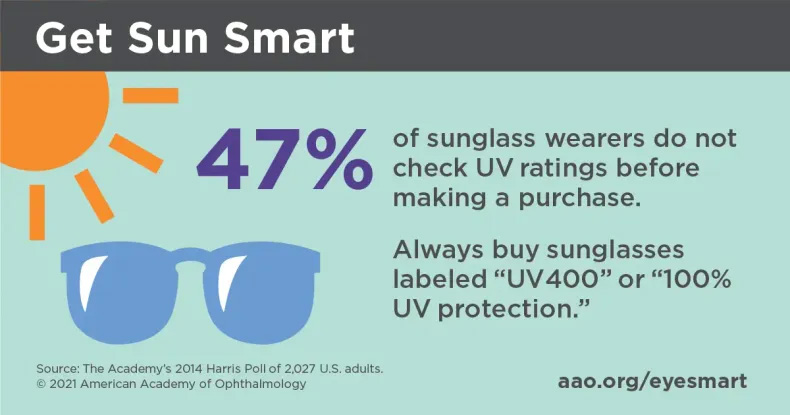Protection is Key!
Sunglasses are must-have eyewear. They help reduce brightness and protect your eyes and vision in any season.
Sunglasses are more than fashion accessories. They protect your eyes from ultraviolet (UV) rays, the radiation energy produced by the sun. These UV rays—including UVA and especially UVB—damage the eye’s surface tissues, cornea and lens. That damage can lead to cataracts, macular degeneration and other vision-stealing eye conditions.
Sunglass Selection Tips
To help keep your eyes healthy, keep these tips in mind when buying sunglasses.
Don’t settle for less than 100% UV protection
When buying sunglasses, make sure they have a tag or sticker that says they provide 100 percent UV protection from all UV light. Some labels say “UV absorption up to 400nm.” This is the same thing as 100 percent UV absorption.
Darker sunglasses don’t always mean they offer more UV protection
When looking for sunglasses, don’t be fooled into thinking the darker the lens, the safer they are for your eyes. Only sunglasses with 100% UV protection provide the safety you need.
Polarized lenses reduce glare, but don’t block UV rays
Polarized lenses reduce the glare bouncing off reflective surfaces such as water or roads. Polarization itself does not provide UV protection. Instead, it provides a better experience for certain activities like driving, boating, or golfing. Polarized lenses can be made with a UV-blocking substance. Check the label of polarized sunglasses to make sure they provide maximum UV protection.
Check lens quality when shopping
You can check that the lenses of nonprescription sunglasses are made properly by following these steps:
- Look at something with a rectangular pattern, like a tiled floor.
- Hold the glasses at a comfortable distance from your face and cover one eye.
- Move the glasses slowly from side to side, then up and down, looking through the lenses.
- If the rectangular lines stay straight, the lenses are fine. If the lines are wavy or wiggle (especially in the center of the lens), try another pair.
Bigger sunglass lenses are better
Sunglasses should have the largest lenses possible to protect your eyes from sun damage. Consider oversized or wraparound-style sunglasses to limit UV rays from entering from the side.
Lens color doesn’t matter for UV protection
Sunglasses with colored lenses (such as amber or gray) don’t block out more sun. However, a brown or rose-colored lens can provide more contrast. Athletes who play sports such as golf or baseball often find this extra contrast useful.
Mirror finishes are thin layers of metallic coatings on an ordinary sunglass lens. They do cut down on the amount of visible light entering your eyes. Don’t assume, however, they will fully protect you from UV light.
And remember that very dark-colored lenses may look cool, but they do not necessarily block more UV rays.
Think of impact protection when buying sunglasses
In the U.S., all sunglasses must meet Food and Drug Administration (FDA) impact safety standards. While no lens is truly unbreakable, plastic lenses are less likely than glass lenses to shatter. Most nonprescription sunglass lenses are made from some type of plastic.
For sports, polycarbonate plastic sunglasses are especially . But if they are uncoated they do scratch easily. Polycarbonate lenses normally come with a scratch-resistant coating.
Price is not related to protection
Sunglasses don’t have to be expensive to be safe and effective. Drugstore sunglasses labeled as 100 percent UV-blocking are a better choice than designer sunglasses with no protection.
When Sunglasses Don’t Help
Normal sunglasses will not protect your eyes from certain light sources. These include tanning beds, snowfields, and arc welding. You need special lens filters for these extreme situations. Also, sunglasses do not protect you if you stare directly at the sun, including during a solar eclipse. It’s never OK to do that!
Looking at any of these light sources without the right eye protection can cause photokeratitis. Photokeratitis is serious and painful. It can even damage your retina, leading to permanent loss of your central vision. Ask your ophthalmologist to recommend the proper eye protection for special situations.
Some people wonder if older sunglasses still protect your eyes from UV light. Research hasn’t shown if UV protection fades over time. But you can have your sunglasses tested. Simply take your sunglasses to an optical shop that has a UV light meter to check the level of protection.

